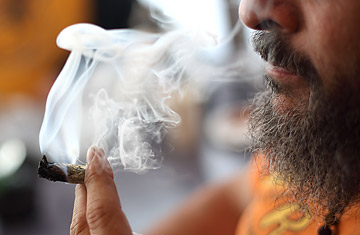
A man smokes marijuana in Berkeley, California.
(2 of 2)
The key difference between the cannabis-sensitive patients and the nonaffected group was a family history of disease: those in the former group had three times the number of close relatives with psychotic disorders, says Krebs. Further, the sensitive group started smoking pot at a younger age — before age 17, compared with 18 in patients without marijuana sensitivity — and Krebs thinks the early exposure may have critically altered the development of brain receptors affected by marijuana.
These receptors, known as endocannabinoid receptors, affect the action of the brain's dopamine systems, fine-tuning the response of the neurons involved. Although this process is not yet completely understood, changing the way endocannabinoids influence dopamine during development could result in a chronically high level of dopamine in some regions of the brain, which may increase the likelihood of psychotic episodes. Stimulant drugs such as amphetamine and cocaine, which increase the action of the dopamine system, for instance, are known to produce psychotic experiences, while antipsychotic drugs work by blocking the brain's dopamine receptors.
Given that an estimated 50% of the risk for schizophrenia is attributable to genes and family history, disseminating the results of research like Krebs's could help delay the onset of disease in thousands of people and prevent years of severe disability in those with a family history of schizophrenia. Although the disease itself affects only 1% of the population, about 10% of healthy people have personality features that, when intensified, may characterize schizophrenia — such as paranoia — meaning that the proportion of the population who may be sensitive to marijuana could be larger than expected, Krebs says.
However, discouraging marijuana use in patients who have schizophrenia or are at high risk of developing it is a complicated task, not least because the drug is extremely popular with this group. Their affinity for the drug may be related to a phenomenon recently described in a study published in the British Journal of Psychiatry: The research tracked the moods of 80 marijuana smokers, 42 of whom had psychotic disorders like schizophrenia. Participants were asked to record their moods at various points over the course of six days, determined by a watch that beeped periodically to signal the volunteers. All participants, not surprisingly, reported feeling happier when they were high, but the mood-lifting effect of marijuana was stronger among smokers with schizophrenia. Unlike people without the disease, schizophrenia patients also reported a reduction in negative feelings after smoking marijuana. "Everyone feels better," explains lead author Cecile Henquet, an assistant professor of psychology and psychiatry at Maastricht University in Holland. "But [schizophrenia] patients also have less anxiety and are less socially withdrawn."
But which is the chicken and which is the egg? In another study by Sevy at Albert Einstein College of Medicine, researchers interviewed adults with schizophrenia (and their families) who smoked marijuana, and found that they reported being better adjusted during childhood than those who did not indulge. It makes sense when you consider the practicalities and social nature of drug use. Being at least somewhat socially connected is necessary to be able to obtain an illegal drug — if you appear too "crazy," people are less likely to befriend you and dealers may be too wary to sell to you. Many people with schizophrenia exhibit odd behavior that puts them at risk for social rejection years before they develop full-blown delusions and hallucinations in adulthood.
The access issue may also help explain why some studies find better — not worse — cognitive functioning in people with schizophrenia who smoke marijuana. That's what Pamela DeRosse, a research scientist at Long Island's Feinstein Institute for Medical Research, and her colleagues found in a study of 455 people with schizophrenia published in Schizophrenia Research in July. The research showed that patients who smoked marijuana had faster brain processing speed, greater verbal ability and better memory than patients who didn't smoke — not attributes usually associated with being high. "I can't really tell you why they aren't doing worse," says DeRosse. "But in order to go out to even find cannabis, enough to become dependent or abuse it, requires that you be more cognitively intact than the average patient with schizophrenia."
Indeed, many schizophrenia patients who smoke pot smoke enough to become addicted. As Henquet's study showed, the drug's mood-boosting effects appear immediately after smoking, as do some hallucinations, but the bulk of negative marijuana-related effects appear later on, as an increased rate of hallucination that affects patients even when they are not high. This is the exact type of drug effect that raises addiction risk: The user's experience is one of short-term gain associated with the drug, with long-term pain that seems unrelated. "This is what explains why patients with schizophrenia use cannabis for longer and more frequently than controls," says Henquet. "They are apparently more sensitive to the addictive potential than other people."
That marijuana can have such incompatible effects in schizophrenia patients — enhancing mood while exacerbating hallucinations and delusions — is not surprising, when its chemical makeup is considered. One chemical called delta-9 tetrahydocannabinol (THC) is known to cause hallucinations and in high doses can even make healthy people feel paranoid or suffer brief attacks of psychosis. But another component of marijuana called cannabidiol (CBD) has anti-psychotic effects.
Consequently, researchers who study the knotty relationship between drug use and schizophrenia hope that patients may one day benefit from cannabis-derived drugs. The key is to replicate the antipsychotic properties of CBD without triggering the risks carried by THC. But in the meantime, scientists are still trying to identify which patients, based on genes and family history, may be most helped by potential new pharmaceutical drugs and who may be spared harm by avoiding illicit drug use now.
